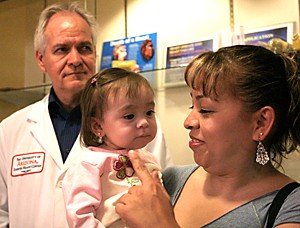Tiana Lopez toddled happily back and forth between her mother and father while smiling for the camera at University Medical Center yesterday – not something you’d normally expect from a girl released from the hospital last Saturday.
The 17-month-old Tiana underwent surgery February 28 to remove her Berlin Heart, a
ventricular assist device that had been in place since February 7. Tiana is the third young child at UMC to recover from this relatively new procedure, according to Dr. Jack Copeland, who performed the operations.
Copeland presented Tiana, her mother Patricia Lopez and her father Ryan Lopez with the 25ml Berlin Heart that saved Tiana’s life in a shadowbox with pictures of Tiana in different stages of the procedure, and a small plaque that was engraved with “”Our biggest little heart.””
Tiana’s recovery is coming along well, Copeland said, and her first follow-up appointment since being released was yesterday afternoon.
“”She’s a pioneer,”” Copeland said. “”She’s breaking new ground for children. It’s going to change the whole way we look at ventricular assist devices in children.””
Patricia Lopez said she knew Tiana was back to normal when she started chasing around the dogs at home.
“”She’s doing great,”” she said. “”She’s very playful and back to herself.””
The Lopez family is keeping all the memorabilia related to Tiana’s surgery to remind her of what she’s accomplished in life as she grows up.
“”It’s a miracle to see this happen,”” Patricia Lopez said. “”We’re grateful to the public for all the prayers and support they’ve provided us with.””
We expected a little miracle, and we got it.
– Ryan Lopez, patient’s father
Hopefully Tiana’s success story will be an incentive for the Food and Drug Administration to approve the Berlin Heart, since it currently only has a “”humanitarian use designation,”” said Richard Smith, technical director of the UMC Artificial Heart program.
The Berlin Heart is waiting on a “”humanitarian device exemption”” approval from the FDA – which is reserved for medical devices in fields where no other comparable alternative is available, and only if the device would help less than 4,000 people per year – Smith said.
Smith expects the Berlin Heart to gain FDA approval within three months.
“”Eighty percent of our patients have had successful outcomes,”” Smith said. “”Obviously, the need is available and obviously, it works.””
Ryan said he’s glad that Tiana can be an example for other kids and parents, and hopes other doctors will see her success.
“”We need to look into it more,”” Ryan Lopez said. “”It saved my daughter’s life.””
UMC is planning to remove another Berlin Heart today from 8-month-old Itxair Rodriguez-Moreno.
The Lopez family has met with the Rodriguez-Moreno family to share experiences and lend their support.
“”We knew we were gonna get out of here safe, as a family,”” Ryan Lopez said. “”It’s what we were expecting. We expected a little miracle, and we got it.””
UMC began giving Berlin Hearts to children in 2000, starting with Carlos Ochoa, who is still alive and well today, Smith said.
So far, UMC has performed 10 Berlin Heart procedures on children, six of which were on very young children, Copeland said.
“”We’re moving more toward heart recovery than heart transplant,”” Copeland said.









